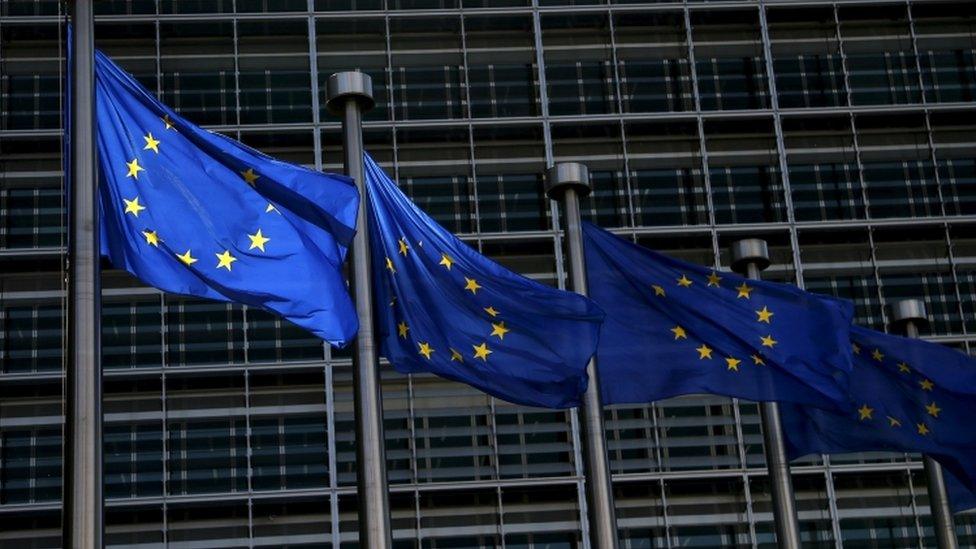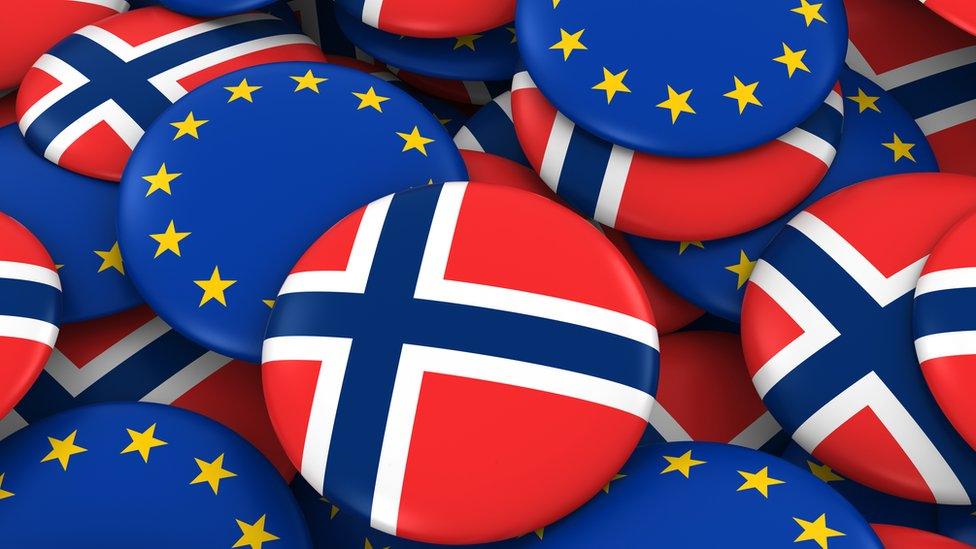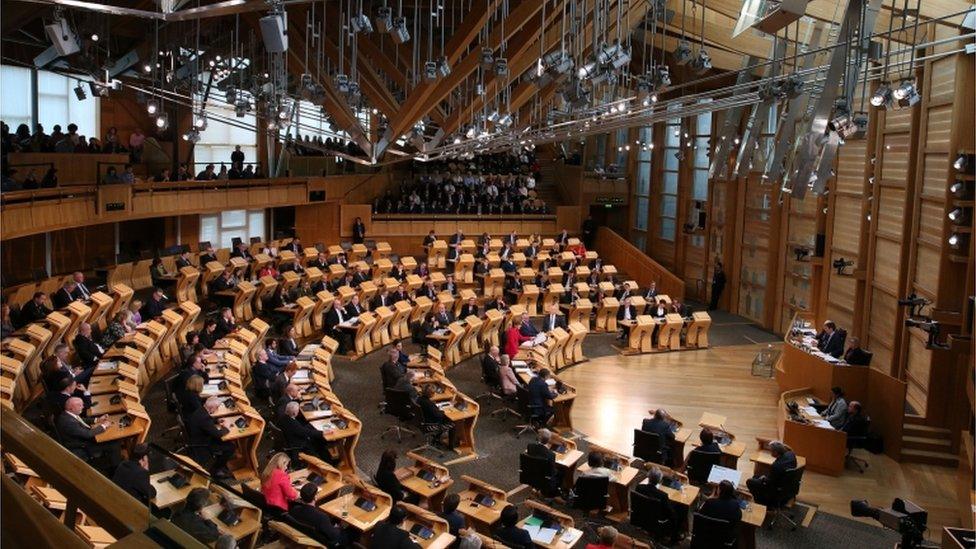Scotland could seek 'Norway model' on EU
- Published
- comments

Scotland voted to remain in the EU while the UK as a whole voted to leave in June's referendum
Scotland could attempt to become a member of the European Economic Area (EEA) when the UK leaves the EU, BBC Scotland has learned.
The so-called Norway model has been privately floated as a possibility as the Scottish government seeks ways to maintain Scotland's links with the EU.
BBC Scotland's political editor Brian Taylor said the plan could give EU citizens the right to work in Scotland.
But it could only happen if the UK and European institutions agreed.
The idea emerged as a leaked memo about Brexit claimed splits in the UK cabinet mean there is still no overall plan for leaving the EU.
But Transport Secretary Chris Grayling said it was not a government memo, and he rejected its contents.
A UK government source said the document was an unsolicited pitch for work from a consultancy firm.
The Scottish government has said it will publish plans aimed at protecting Scotland's place in Europe in the coming weeks.
The EEA includes the existing EU states plus Iceland, Liechtenstein and Norway.
Membership of the EEA allows Norway to have full access to the single market, with the country obliged to make a financial contribution to the EU budget and to accept the majority of EU laws.
Norwegians also have free movement across the EU, with EU citizens free to live and work in Norway too, but the country is not part of the customs union, so it is able to set tariffs for other countries.
Back door access
Norway is exempt from EU rules on agriculture, fisheries, justice and home affairs - but the downside is that Norwegians have no say over how the rules of the single market are created.
Supporters of Scotland attempting to secure EEA membership say it would allow people from EU and EEA countries to work in Scotland even if they faced constraints elsewhere in the UK.
They argue that people employed in Scotland are already identified by a distinct tax code because of Holyrood's new tax powers.
But the UK government might take some convincing if ministers feared it could lead to back door access to the wider UK through Scotland.

Analysis by Brian Taylor, BBC Scotland Political Editor

Let me emphasise a point I have been making all day. This is not, currently, a Scottish government proposal. It has not been endorsed by ministers. It is an option in the mix - but one with influential backing.
Problems? Plenty. Firstly, EEA members are currently all autonomous states, not devolved territories like Scotland.
Secondly, the UK - as the EU member state - would have to give prior approval to such a plan, even if it caught the interest of European institutions.
And, thirdly, UK ministers may take some persuading if they fear that EU/EEA citizens could gain access to the wider UK, through Scotland, post Brexit.

Scottish Conservative finance spokesman Murdo Fraser said the SNP "know full well the EU would not allow Scotland to have a separate deal in the first place when the precedent that would set would go directly against the interests of some member states."
He added: "If the SNP's plan is to back a 'Norway-style' deal for Scotland, separate to the rest of the UK, that would erect a hard border between us and England, our largest market and nearest neighbour.
"And as legal experts have made clear, it would also mean having no say whatsoever in the EU regulations which would still apply to us.
"One of Nicola Sturgeon's grandly-titled 'five tests' was to ensure Scotland had a say in shaping the single market, not just being subject to its rules. So this plan would not just be bad for Scotland, it would even break her own test."
'Best deal possible'
Labour's shadow chancellor, John McDonnell, told the BBC's Good Morning Scotland programme that the UK should not be "divided" over its approach to EU membership.
He said: "In different constituencies, different regions, there were different views, but the overall view unfortunately was to withdraw from the EU.
"Let's work together constructively to get the best deal possible. What we need to do is make sure the Scottish government is working with the UK government overall."

The Scottish Parliament is to debate the country's membership of the EU single market on Tuesday afternoon
It comes Holyrood prepares to debate a Scottish government motion urging MSPs to back Scotland staying within the European single market.
The motion calls on Scotland's place in the single market to be "fully protected", and calls for clarity from the UK government on its proposals to leave the EU, including whether it will seek continued membership of the single market.
Speaking ahead of the debate, SNP MSP Bruce Crawford said the UK government was "mired in confusion" over questions such as whether the UK and Scotland should be in the single market.
He added: "Every area of Scotland voted to remain in the EU and today's debate is an opportunity for the Tories and all other parties to reject a hard Brexit and stand up for Scotland.
"At this crucial stage while the UK government is still working out its negotiating position, this is the time to make Scotland's voice heard and challenge head-on those who want to lead us out of the single market, with all the costs to Scottish jobs and the economy."
'Growth shock'
Meanwhile, a report prepared for Holyrood's economy committee has estimated that Scotland could face further cuts in a Brexit "growth shock".
Economic think-tank IPPR Scotland said that if UK Chancellor Phillip Hammond uses public spending cuts to plug the whole of the £25bn UK budget gap per year by 2019/20 projected by the Institute for Fiscal Studies (IFS), it would cause a further £1.3bn cut to Scottish funds.
The scenario was one of three modelled by the think-tank, which also examined the impact of Westminster using public spending to deal with half or quarter of the budget gap - found to cause £670m and £330m further cuts to the Scottish settlement.
IPPR Scotland director Russell Gunson said: "Any further cuts to day-to-day spending in the rest of the UK could mean cuts for Scotland's budgets too, on top of very significant cuts already planned over the coming years."